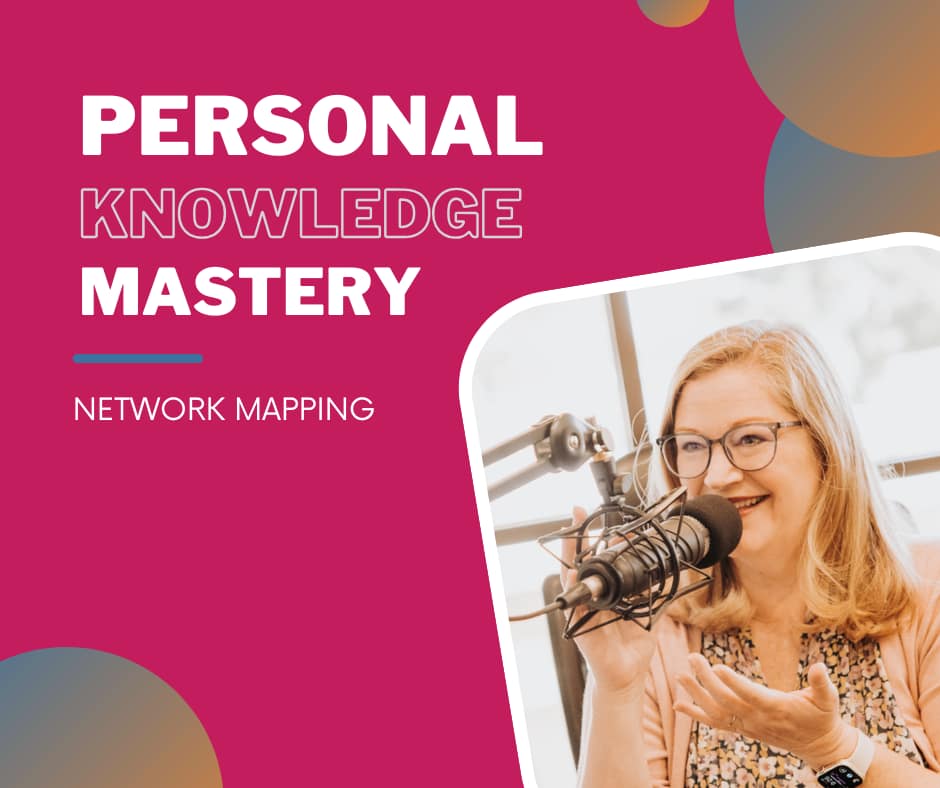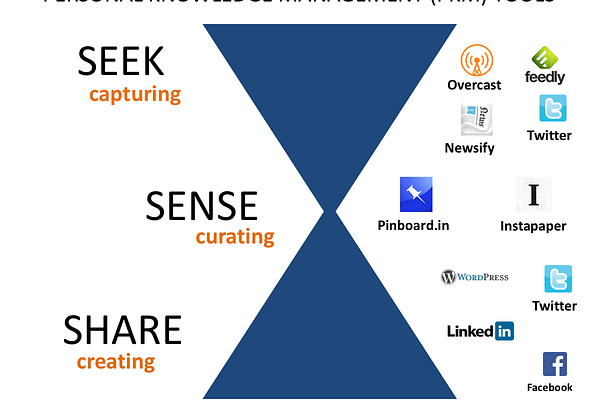
I’ve just embarked on Harold Jarche’s Personal Knowledge Mastery (PKM) Workshop (October–November 2025). The first invitation Jarche gives is to examine our networks. We begin with a naming exercise: the top four people who come to mind in response to prompts like:
- Who do you most frequently communicate with to get work done?
- Who do you approach for career or work advice?
- Who are the main people you socialize with informally?
- Who do you contact when facing complex work problems?
After listing names, we reflect on their demographics, roles, ages, and how much diversity (or lack thereof) we see in our knowledge network. Jarche encourages us to spot gaps and opportunities for expanding who we include.
Because the prompt focuses on recent months, I observed that some of the questions hit harder than others, given what I've been up to, lately. For example, I haven’t been actively job-searching for a long while, so the aspect of the career advice question focused on who I reach out to when considering whether to accept a job or leave my organization felt a bit hypothetical. But answering using a longer time span than solely these last few months nudged me to think about past seasons in which those questions were more pressing.
Serendipitous Invitations and Saying Yes
One outcome of doing the naming exercise is that it reminded me of an invitation to co-facilitate a book study with two other friends. The topic was not related to my formal role at work. The three of us had joked throughout the month-long study about whether we chose the worst possible evening for it. I teach a multi-hour block on Monday afternoons and my fellow facilitators also had all sorts of things going on in their professional and personal contexts. And yet, we were ultimately all glad to have said yes to the commitment.
It ended up being challenging, yet hopeful: people with shared values, diverse perspectives, different paradigms, and a desire to consider our role in the work to live out what we believe. It made me appreciate intentionally saying no to lesser priorities so that I can say yes to what matters most.
After browsing and reflecting on some of the supporting materials that Jarche includes about network mapping, I realized that this experience may be emblematic of “The Strength of Weak Ties,” an idea brought forth by Mark S. Granovetter back in 1973. Granovetter defines the strength of a tie as a composite of time spent, emotional intensity, intimacy (mutual confiding), and reciprocal services. He shows that as tie strength increases, so does overlap in one’s social circle (i.e. your strong ties tend to know each other). Weak ties, being more distant, often serve as bridges between clusters in a network. He reveals about the strength of ties:
Most intuitive notions of the “strength” of an interpersonal tie should be satisfied by the following definition: the strength of a tie is a (probably linear) combination of the amount of time, the emotional intensity, the intimacy (mutual confiding), and the reciprocal services which characterize the tie.
Granovetter also shares the understandable emphasis on strong ties, yet also cautions us about what is lacking in our personal and societal development, were we to focus exclusively on strong ties. He writes:
Treating only the strength of ties ignores, for instance, all the important issues involving their content. What is the relation between strength and degree of specialization of ties, or between strength and hierarchical structure?
The article is pretty dense reading and I am only skimming the surface here, no doubt not quite getting the richness of what he shares.
The Teaching in Higher Ed Network
I’ve long been grateful for my Teaching in Higher Ed podcast and the network is has helped me to cultivate since June of 2014. Over the 11+ years, it’s connected me with people across disciplines and invited discussions about assessment, AI, pedagogy, digital literacy, and more..
By the way: Harold Jarche has been a guest on Teaching in Higher Ed (Episode 213). It was an honor to speak with him, after having followed his work for such a long time. In that episode, he says, “You can’t turn data into information until you have the knowledge to understand the data.” That line struck me again as I think about how PKM is about sense-making, not just accumulation of information.
My Most Frequently-Mentioned Name
As I reviewed my responses, the name that surfaced most often was Dave (my husband). That shouldn’t surprise me: we met while earning our master’s degrees, later pursued doctoral work together, and share many disciplinary interests. He is also someone who regularly challenges my thinking while supporting me. His name appeared in questions about deep matters, who I talk to when launching something new, someone I informally socialize with, a person I want to talk to about complex problems, and finally to get career advice from.
Informal Socializing: Breaking the Rule
One of the prompts asked: Who do you socialize with informally?
I confess: I broke the rule of listing specific names. First off, I really don't socialize informally very often, at all. Most time I spend with others is somehow geared toward an aim of some kind. My informal socializing is mostly with my immediate family (Dave and our two, curious children).
I also reflected on the recent optional activity I did with the students enrolled in my personal leadership and productivity class, while answering the questions posed by Jarche for this activity. They have an assignment to plan their 85th birthday party, which is based off of a prompt offered by Stephen Covey in the 7 Habits of Highly Effective People. After students reflect, they can optionally sign up for a time to join me on campus or online for a time to celebrate and reflect together on what they learned.
That, plus I bring cupcakes and play Stevie Wonder's Happy Birthday song (which thus far, 100% have agreed is the best of the birthday songs).
Reflections & Next Moves
A few reflections and intentions as I begin Jarche's PKM workshop this week:
- New seasons evolve my network ties. My closer-knit network in recent months reflect my focus during that time. In a different season, I would have listed different people.
- Mix strong and weak ties. I already see how much value my core, close relationships (like Dave) bring. But I also am thankful for the times when my podcast allows me to reach outward, diversify, and surface my weaker ties that bring novelty and new perspectives.
- Nurture the giving habit. As Rob Cross (in his work on networks) says, effective networks often grow when people give first and who go beyond the superficial.
I have enjoyed this opportunity to reflect on my networks and look forward to continuing to explore some of the resources that Harold includes. I'm also ready to get to learn more about the others participating in the PKM workshop these next couple of months. If I know anything about PKM and about Harold, it is what will become “us” as a cohort that will make the biggest difference in our learning.
Plus that whole thing about getting out of something what you put into it…


